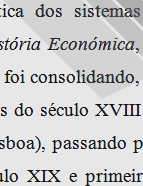

................................
A more detailed analysis of the author's Curriculum Vitae may be found in the "Introduction" to the 2nd edition of the aforementioned work (Torquato de Sousa Soares, História da Administração Pública em Portugal, vol. I, 1945, pp. IX-LXXIV). In the early stages of economic history, as outlined, the following trends were evident: a) it was not yet a structured research area, with economic facts primarily addressed in chapters or sections of broader works rather than in standalone studies, with few exceptions (Acúrsio das Neves and Oliveira Martins); b) a preference for topics related to commerce over productive sectors (agriculture and industry) was observable; c) there was a tendency to frame economic factors within the political and administrative context, with greater emphasis on the latter. Phase 2 ( first three decades of the 20th century). This period of political transformation—the fall of the Monarchy,, the proclamation of the First Republic (1910), the Military Dictatorship (1926-1932), and the early years of the Estado Novo (1933)—and the acceleration of industrialisation, brought significant developments in economic history. During this time, the emphasis on industrial issues increased, and works dedicated exclusively to economic history began to emerge. Regarding the history of industry, its origins date back to the 1880s, with notable development in the subsequent decades. In fact, between 1881 and 1930, sixty studies on industrial history by twenty-five authors were identified. "As these studies are not industrial history as we conceive it today—nor did the discipline have an autonomous status—their authors were rarely referred to as historians" (Manuel Ferreira Rodrigues, "A primeira historiografia da indústria..."[The first historiography of industry..."], 2013, pp. 378-379). One of the works related to industry and its history is Portugal Económico. Theorias e Factos [Economic Portugal. Theories and Facts] vol. I (2nd ed. 1918; 1st ed. 1902) by Anselmo de Andrade. This historian, who was born and died in Lisbon, graduated from the Faculty of Law of the University of Coimbra. He was a writer, economist, publicist, lawyer, and politician, holding various positions, including Director of the Institute of Agronomy and Veterinary Medicine and Minister of Finance, a role he held at the time of the proclamation of the Republic (1910). He published several works on economics: Economia Nacional comparada A Terra [Comparative National Economy the Land] (1898); História económica do ouro [Economic history of gold](1910); and Política, Economia e Finanças nacionais contemporâneas [Contemporary national politics, economy and finances](1928).
